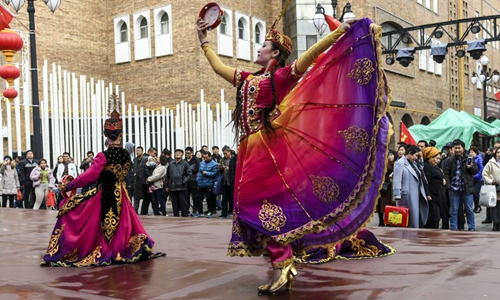HOME >> OPINION
China’s approach in Xinjiang best answers Western criticism
By Huang Bin Source:Global Times Published: 2019/12/11 17:14:58

Tourists watch dancing performance at the Xinjiang International Grand Bazaar in Urumqi, Northwest China's Xinjiang Uyghur Autonomous Region, November 7, 2019. Photo: Xinhua
US House of Representatives giving the nod to the so-called Uyghur Human Rights Policy Act on December 3 shows that the US is once again using human rights as a tool to interfere in other countries' domestic affairs and is violating international law as well as norms of international relations.The US deliberately ignored thousands of terrorist attacks that claimed a large number of innocent lives in the past years in China's Xinjiang Uyghur Autonomous Region. It overlooks China's anti-terror achievements and confuses right with wrong on human rights in Xinjiang. It seeks to sow discord among ethnic groups and religious communities there in an attempt to contain China, so as to realize its hegemony and power politics.
Since the end of 19th century, the evil forces of secessionism, terrorism and extremism have taken advantage of people's ethnic and religious sentiments, laid claim on Xinjiang as "East Turkestan," and clamored for breaking up the region from China. The three evil forces wreaked havoc in Xinjiang by insanely killing innocent people and attacking government buildings. They damaged public security and jeopardized Xinjiang's economic development as well as social stability.
To counter such acts, the Chinese government has adopted a zero-tolerance attitude toward violence and terrorism, and began conducting special operations to weed out terrorists since 2014.
In contrast to what the US claims as "forced disappearances, extralegal detentions, invasive and omnipresent surveillance, and lack of due process in judicial proceedings" and "mass arbitrary detention," the Chinese government has been combating terrorism in Xinjiang according to law and in line with the UN Charter as well as a series of counter-terrorism resolutions adopted by the UN Security Council. For three consecutive years, no violent terrorist attack has taken place in Xinjiang.
Xinjiang has also put in place preventative anti-terror measures. The regional government has adopted various statutory measures and established a counter-terrorism and precautionary system under the law.
Some scholars believe terrorist groups work under a pyramidal hierarchy, in which terrorists and extremists at the bottom level are usually brainwashed and misled to become accomplices in terrorism under duress. This group of terrorists is often poor and undereducated, and more willing to make quick money rather than receive time-consuming education.
The Chinese government respects and protects religious freedom as well as different ethnic groups' customs, including religious festivals such as Eid al-Fitr, also called the "festival of breaking the fast," and the Corban Festival, also known as Eid al-Adha or the feast of sacrifice. The government attaches importance to people's livelihood in Xinjiang. It has improved infrastructure, popularized the country's common language, promoted education and employment, as well as urbanization in the region so as to reduce the possibility of terrorist forces instigating and deluding ordinary people.
Through vocational training, legal and common language education, people who were once brainwashed by extremism can better integrate with Xinjiang's modern society. This is a real guarantee of human rights.
Thanks to these efforts, Xinjiang has seen lasting stability and economic growth. In 2018, the per capita disposable income of the region reached 21,500 yuan ($3,188), an increase of 7.6 percent from 2017.
Terrorism is human society's common enemy and the biggest security threat to all countries and regions. Anti-terror struggle should no longer be limited to conventional combat. More fundamental measures, such as precautions and fighting against extremism, should be explored.
Some Western countries have taken similar measures. The UK has the Desistance and Disengagement Programme that makes it mandatory for all terrorism-related offenders to receive training; Germany has tightened its surveillance laws as its counter-terrorism measures continue to expand. Every country has explored ways to limit the freedom of extremists and some have put them under centralized de-radicalization programs. How can similar security measures taken by China be tarred as "forced labor" or "concentration camps?"
China's approach has been in consonance with the real protection of human rights by conforming to the rule of law, guaranteeing better livelihood, and ensuring the right to survive and develop of every terrorist and extremist who can be saved. This is the best response to groundless condemnation by the US-led Western world.
The author is director of the Regional Counter-terrorism Research Center of Fujian Police College in South China. opinion@globaltimes.com.cn
Posted in: VIEWPOINT